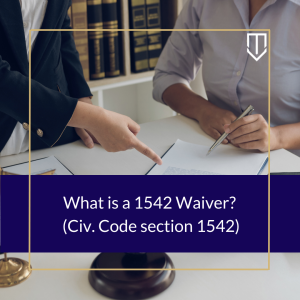 Civil Code section 1542 provides, “A general release does not extend to claims that the creditor or releasing party does not know or suspect to exist in his or her favor at the time of executing the release and that, if known by him or her, would have materially affected his or her settlement with the debtor or released party.”
Civil Code section 1542 provides, “A general release does not extend to claims that the creditor or releasing party does not know or suspect to exist in his or her favor at the time of executing the release and that, if known by him or her, would have materially affected his or her settlement with the debtor or released party.”
Settlements are a key aspect of litigation. As roughly 95% of all civil suits end with settlements, litigants are bound to come across these agreements, because that’s what settlements ultimately are – agreements. And though each settlement will ultimately differ depending on the circumstances, there are some settlement terms in California that are simply ubiquitous.
These, of course, are agreements related to “release” and “waiver.” These are legal terms that relate to settlement provisions whereby both parties agree to release any claims they may have against each other. Almost every settlement has a section related to a “release.”
 California Partition Law Blog
California Partition Law Blog


 Attorney’s fees are those fees owed by a client to an attorney who performed legal services on behalf of the client. In some cases, a court may order the losing party to pay the attorney’s fees of the other party. Whether attorney’s fees are available as damages depends on the nature of the action. In cases involving a breach of contract, whether attorney’s fees are available generally depends on the terms of the contract.
Attorney’s fees are those fees owed by a client to an attorney who performed legal services on behalf of the client. In some cases, a court may order the losing party to pay the attorney’s fees of the other party. Whether attorney’s fees are available as damages depends on the nature of the action. In cases involving a breach of contract, whether attorney’s fees are available generally depends on the terms of the contract.